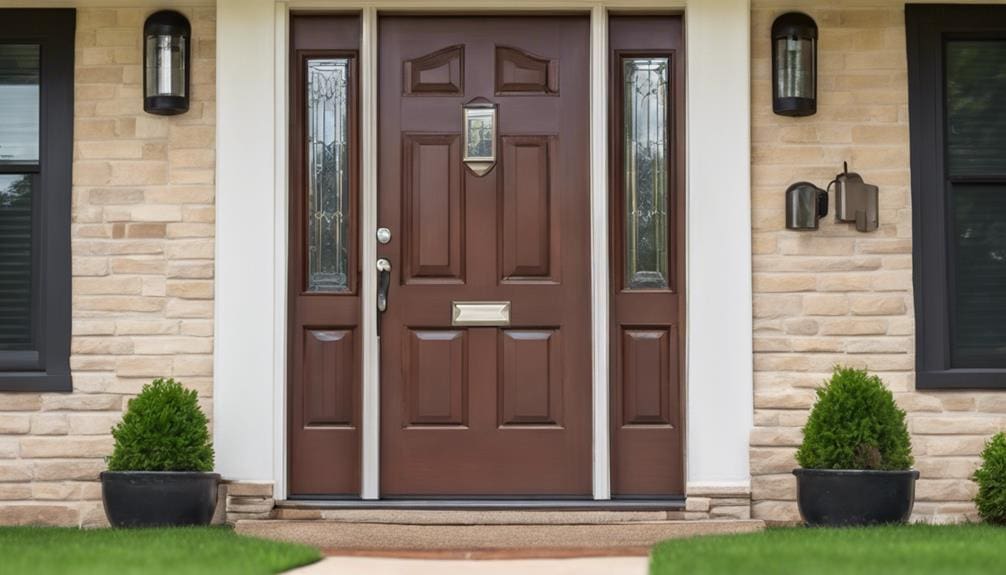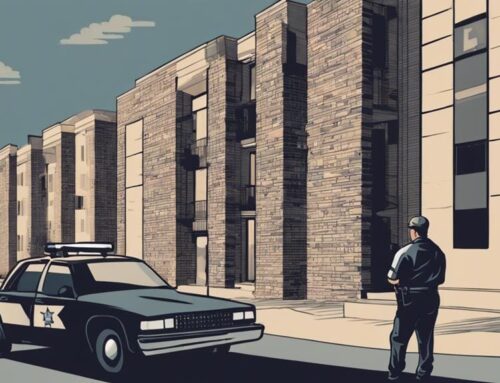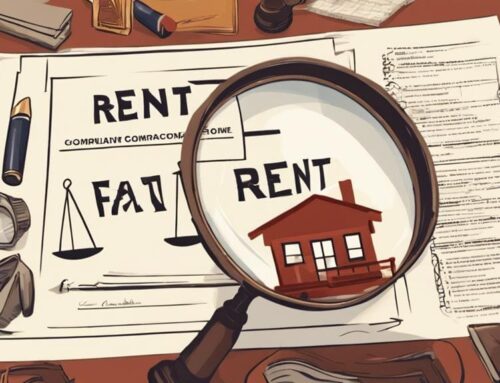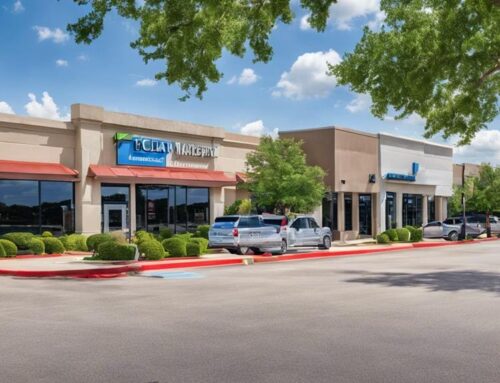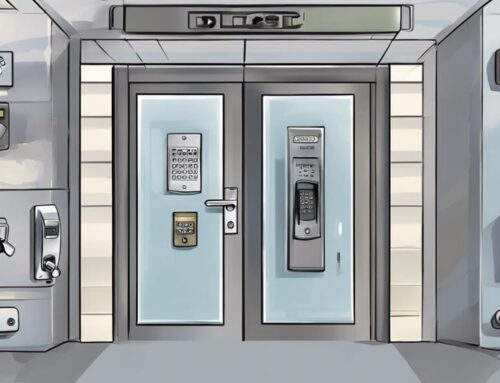To comply with Texas residential door lock regulations, guarantee your property includes keyed deadbolts, keyless bolting devices, and door viewers. Between tenancies, rekey or change locks within seven days without charging tenants. Landlords must perform lock repairs for normal wear and tear at no cost to tenants and address repair requests promptly. Non-compliance can lead to legal action, resulting in potential damages and legal fees. Additionally, security measures for sliding doors, like pin locks, are mandatory. Proper adherence to these regulations guarantees tenant safety and legal compliance. Discover more detailed stipulations and your specific obligations as a landlord.
Key Takeaways
- Keyless deadbolts and door viewers are required on all exterior doors.
- Landlords must rekey or change locks within seven days of a new tenant moving in.
- Tenants are entitled to no-cost lock repairs due to normal wear and tear.
- Sliding door pin locks and handle latches are mandatory security measures.
- Tenants can pursue legal action for lock issues, potentially recovering damages and attorney fees.
Required Security Devices
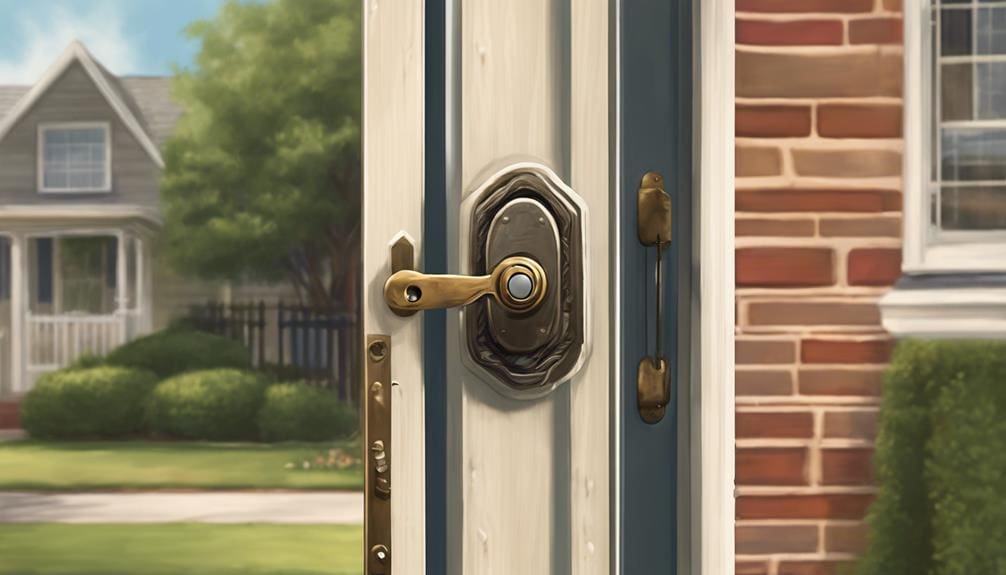
To adhere to Texas Property Code regulations, landlords must install specific security devices on all exterior doors, including keyed deadbolts, keyless bolting devices, and door viewers. These requirements guarantee that residential properties maintain high safety standards for tenants.
Keyed deadbolts provide a robust line of defense against unauthorized entry, while keyless bolting devices offer an additional layer of security that can be quickly engaged from inside the home.
Door viewers, commonly known as peepholes, enable tenants to see who’s outside before opening the door, thereby enhancing their personal security.
For sliding doors, a sliding door pin lock is mandatory, adding another level of protection to these potentially vulnerable entry points. Handle latches should also be installed to secure sliding doors effectively.
Compliance with these security device requirements is non-negotiable under the Texas Property Code. As a landlord, you’re responsible for guaranteeing that every exterior door of your residential property is equipped with these mandated security measures.
Failing to adhere to these regulations couldn’t only compromise tenant safety but also lead to legal ramifications, including lease termination. Prioritizing these installations fosters a secure and welcoming environment for all tenants.
Lock Changes Between Tenancies
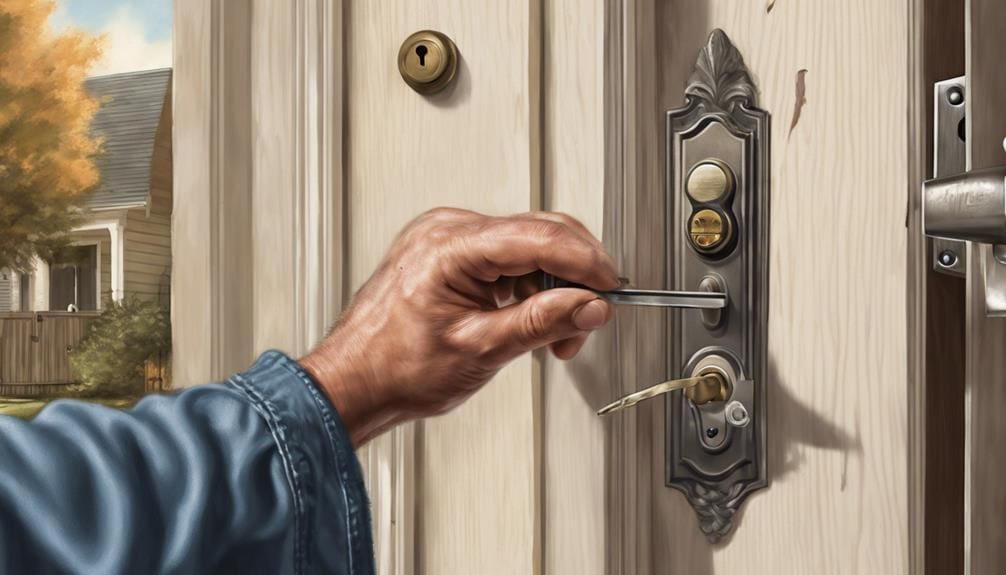
Landlords in Texas must rekey or change all key-operated locks on exterior doors within seven days after a new tenant moves in, as mandated by state law. This regulation secures the peace of mind and safety of the new tenant, making it an essential compliance requirement for landlords. Failure to follow this stipulation can lead to significant legal penalties, including potential lawsuits where tenants might recover actual damages, rent, attorney fees, and court costs.
Rekeying is important during lock changes between tenancies to prevent former tenants from accessing the property. State law prohibits landlords from charging for lock repairs that result from normal wear and tear, although tenants might bear costs for damages caused by misuse, as outlined in the lease agreement.
If a landlord neglects to rekey or replace key-operated locks on outside doors, tenants can issue a demand letter requesting compliance. Ignoring this request can expose landlords to legal actions, highlighting the importance of timely lock changes.
Landlords must remain vigilant in fulfilling their obligations to rekey locks within the specified timeframe. Ensuring adherence not only meets legal requirements but also fosters a sense of trust and security among tenants.
Lock Repair Policies
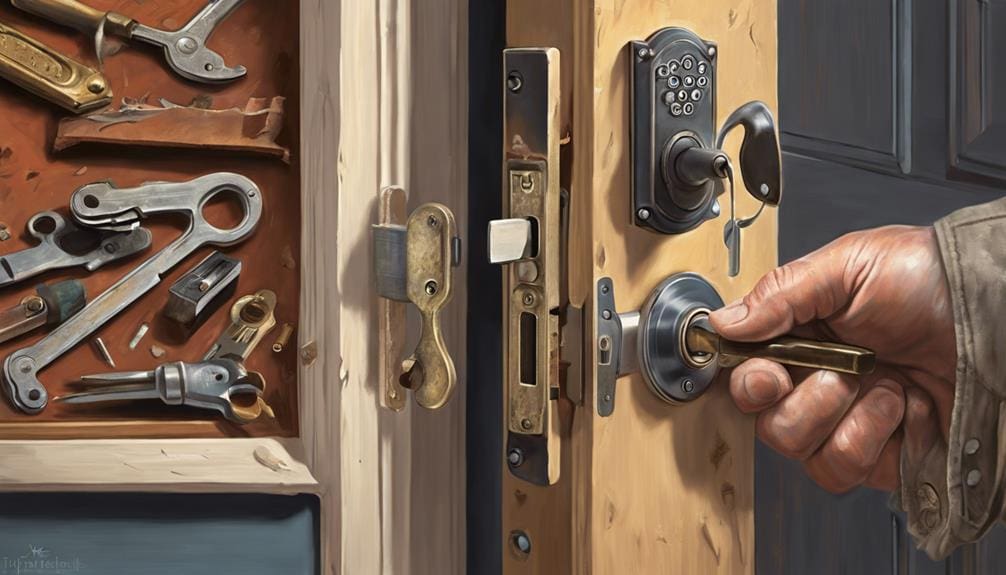
Upholding compliance with Texas law, landlords mustn’t charge tenants for lock repairs stemming from normal wear and tear. As a tenant, you have specific rights under Texas lock repair policies that safeguard your interests. When it comes to lock damage caused by normal wear and tear, the landlord bears the legal obligation to cover repair costs.
However, if the lock damage results from misuse or negligence, the lease agreement may stipulate that you, the tenant, are responsible for the repair costs.
Here are key points to keep in mind:
- Tenant Rights: Tenants are entitled to lock repairs at no additional cost if the damage is due to normal wear and tear.
- Landlord Responsibilities: Landlords must address lock repair requests promptly and efficiently.
- Lease Agreement: Review your lease agreement to understand the specific terms regarding lock damage and repair responsibilities.
- Legal Obligations: Landlords have a legal duty to provide functional locks and can’t impose charges for repairs due to normal wear.
- Demand Letter: If necessary, a demand letter can be used to formally request lock repairs or installations.
Understanding these elements ensures that both you and your landlord uphold your respective responsibilities and rights.
Legal Actions for Lock Issues

When landlords fail to install or repair necessary security devices, tenants can pursue legal action in justice court to enforce compliance and recover associated costs. If you’re facing lock issues, the law provides a clear pathway for addressing these problems. You can file a lawsuit in justice court to compel your landlord to adhere to repair regulations. This avenue isn’t just about getting the lock fixed; you’re also entitled to recover actual damages, which can include rent deductions, attorney fees, and court costs.
Legal actions for lock issues can be an important tool. Specific guidelines exist to streamline the filing process and guarantee your case is heard promptly. Should your landlord’s failure be intentional or negligent, punitive damages might also come into play, providing an additional layer of recourse.
It’s essential to understand your rights and the potential financial implications for your landlord. By pursuing legal action, you’re not only seeking immediate relief but also holding your landlord accountable for failed installation or repair of necessary security devices. This compliance focus ensures that your living environment remains secure, meeting the standards mandated by Texas law.
Rekeying Locks

In Texas, rekeying locks within seven days of a new tenant’s move-in is a necessary legal requirement that landlords must strictly adhere to. This regulation ensures security for the incoming tenant and aligns with Texas’s broader residential security mandates. As a landlord, you must rekey all exterior doors, including those leading to the garage, and install keyless deadbolts as part of this process.
Failure to comply with these Texas regulations can lead to significant legal consequences, including the possibility of lease cancellation initiated by the tenant.
It’s important to understand and implement the following key points to remain compliant:
- Rekeying locks must be done within seven days of a new tenant moving in.
- Landlord expense: The cost of rekeying locks can’t be passed on to the tenant.
- Exterior doors: All must be rekeyed, including those leading to garages.
- Keyless deadbolts are required on all exterior doors.
- Legal consequences: Non-compliance can result in lease cancellation and other sanctions.
Security Measures for Properties
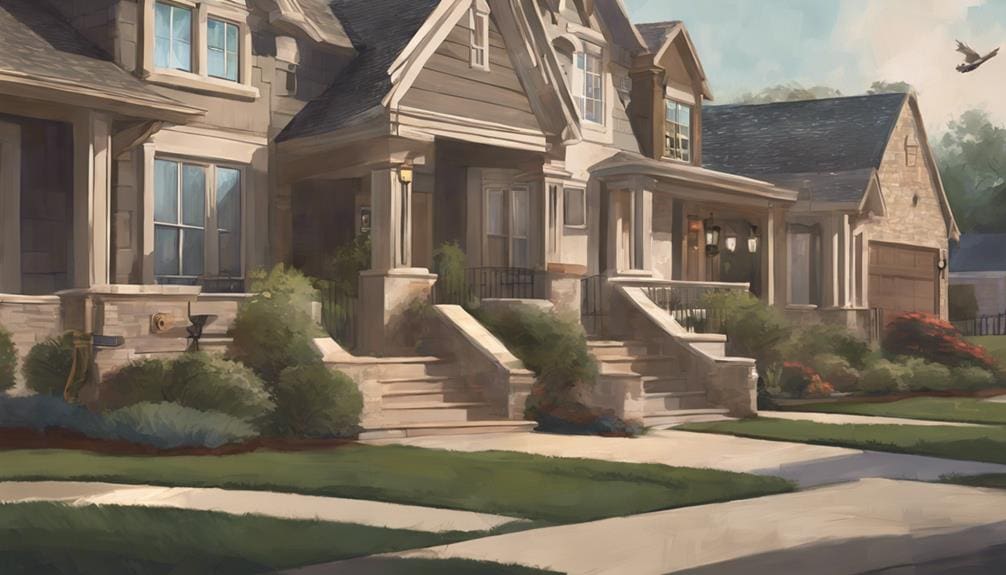
Beyond rekeying locks, Texas landlords must also implement a range of mandated security measures, such as keyless deadbolts and sliding door pin locks, to comply with state residential property regulations. These security devices are important to guarantee property safety and protect tenants from potential break-ins.
For compliance, exterior doors must be equipped with keyless bolting devices and door viewers, which allow tenants to identify visitors without opening the door. Landlords are legally obligated to install these security measures and maintain them in working order. Failure to comply can result in penalties and increased liabilities.
Keyless deadbolts are particularly effective as they eliminate the risk of unauthorized key duplication. Sliding door pin locks add an extra layer of security, especially for ground-floor units, by preventing unauthorized entry through exterior sliding doors.
Proper installation and regular maintenance of these security devices are essential. Landlords should conduct routine inspections to guarantee all mandated security measures are functional. By adhering to these regulations, landlords not only protect their tenants but also foster a sense of community and belonging, making their properties more attractive to prospective tenants.
Compliance with these security measures guarantees a secure living environment, benefiting both landlords and tenants alike.
Tenant Rights and Requests
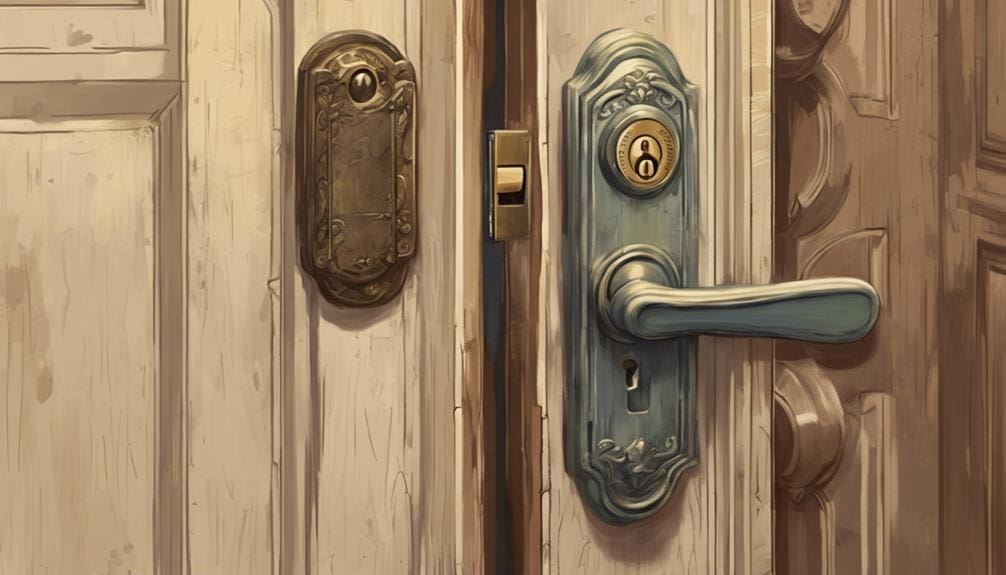
As a tenant, you can request specific security measures such as keyless deadbolts or door viewers, ensuring your safety and compliance with Texas regulations. Landlords must promptly address these requests and install or repair security devices as needed, especially for properties built before September 1, 1993.
Understanding your rights and your landlord’s obligations is essential for maintaining a secure living environment.
Requesting Lock Changes
Texas tenants have an unequivocal right to request lock changes at any time, guaranteeing their security needs are promptly addressed by landlords. State law mandates that landlords must comply with such requests without delay and can’t pass the cost of rekeying or changing locks onto tenants. This guarantees that you, as a tenant, can feel secure in your residence without financial burden.
Key points to note include:
- No Cost to Tenants: Landlords in Texas can’t charge tenants for the cost of lock changes or rekeying.
- Prompt Compliance: Upon request, landlords must promptly address and fulfill the lock change request.
- Mandatory Changes Between Tenancies: Landlords are required to rekey or change locks between tenancies at their own expense.
- Improved Security: Tenants can request lock changes to enhance security measures, ensuring peace of mind.
- Legal Obligation: Texas law obligates landlords to comply with lock change requests, reinforcing tenant rights.
Understanding these requirements empowers you to take control of your living situation confidently. By knowing your rights and the obligations of landlords, you guarantee that your security and peace of mind are prioritized in your housing experience.
Tenant-Initiated Security Measures
While landlords must handle lock changes at no cost to tenants, you also have the right to request specific security devices, such as keyless deadbolts and door viewers, which you’ll need to pay for. This tenant-initiated security measure allows you to enhance your living space’s safety, ensuring peace of mind.
When you submit tenant requests for enhancements like additional locks, landlords are legally obligated to comply with your security device installation requests. Your proactive approach to improve safety through these requested security devices is both empowering and compliant with Texas residential door lock regulations.
It’s essential to understand that while the installation costs fall on you, your landlord must perform the security device installation within a reasonable timeframe. This means your requests can’t be ignored or unduly delayed, fostering a sense of security and belonging in your rental community.
Tenant-initiated security measures, including enhancements to existing security systems, not only protect your personal space but also contribute to the overall safety of the property. By advocating for these enhancements, you’re actively participating in maintaining a secure and compliant living environment for everyone.
Landlord Compliance Obligations
Landlords must promptly follow tenant requests for security device installations, guaranteeing compliance with Texas residential door lock regulations. As a landlord, your compliance responsibilities are crucial for maintaining tenant safety and honoring tenant rights. You’re obligated to install keyless deadbolts, door viewers, and sliding door security bars on all exterior doors. When a tenant requests additional security devices at their expense, you must facilitate these installations without delay.
Key compliance responsibilities include:
- Rekey or replace all key-operated locks on exterior doors within seven days of a new tenant moving in, at your own expense.
- Install door viewers and sliding door security bars to improve tenant safety.
- Respond promptly to tenant requests for specific security devices, guaranteeing their timely installation.
- Ensure that all exterior doors meet specific security device requirements, while certain interior doors may be excluded.
- Understand that failure to comply can lead to legal consequences, including potential lease termination by tenants.
Low Rate Locksmith Texas: Your Licensed Expert
Securing your home in Texas requires knowledge of the state’s residential door lock regulations. These laws cover the types of locks to be used, installation guidelines, and maintenance standards to ensure safety and security.
Low Rate Locksmith Texas excels in providing locksmith services that comply with all Texas residential door lock regulations. As a fully licensed locksmith, they ensure that every lock installation, repair, or replacement meets the highest security standards.
In Texas, locksmiths must undergo rigorous training and certification to obtain their license, ensuring they have the necessary skills to handle various security systems. Low Rate Locksmith Texas not only meets these requirements but continually updates their expertise to stay current with lock technology advancements.
Choosing Low Rate Locksmith Texas guarantees that you are working with a reputable, qualified locksmith who adheres to state laws, providing reliable and secure services. This dedication to compliance and excellence makes them the best choice for locksmith services in Texas.
Frequently Asked Questions
Are Deadbolts Required in Texas?
Yes, deadbolts are required in Texas for all exterior residential doors.
You need both keyed and keyless deadbolts to comply with state regulations.
These locks provide an important layer of security, preventing unauthorized entry and ensuring tenant safety.
As a landlord, it’s vital to meet these standards to avoid legal consequences and foster a sense of security and belonging for your tenants.
Don’t overlook this key compliance aspect.
What Is Section 92.156 of the Texas Property Code?
Have you ever wondered if landlords are truly responsible for your safety?
Section 92.156 of the Texas Property Code mandates that landlords install keyless deadbolts, door viewers, sliding door pin locks, and keyless bolting devices on exterior doors. This regulation guarantees your residential property meets safety standards.
Non-compliance can lead to lease termination, emphasizing the significance of adherence.
You belong to a community that values security and compliance.
Which Lock Requires Use of a Key From Either Side of the Door?
When addressing the need for enhanced security, you’ll find that keyed deadbolts require a key from either side of the door. This measure guarantees robust protection against unauthorized access.
Compliance with this requirement isn’t just about meeting legal standards; it’s about fostering a safe, trustworthy environment for tenants.
Adhering to these regulations not only safeguards property but also strengthens community trust and cohesion.
Are Landlords Required to Change Locks Between Tenants in Texas?
Yes, in Texas, landlords are legally liable to rekey or replace all key-operated locks on exterior doors within seven days after a new tenant moves in.
This compliance guarantees consistent security, protecting the new tenant. Neglecting this requirement can lead to legal liabilities and penalties.
You’re part of a community that values safety and compliance, so adhering to these regulations is essential for maintaining trust and tenant satisfaction.
Conclusion
To conclude, understanding Texas residential door lock regulations isn’t just compliance—it’s peace of mind. Ensuring your property meets these standards protects you and your tenants, fostering trust and security.
Don’t overlook the importance of timely lock changes, repairs, and rekeying; these aren’t just boxes to check, they’re safeguards against potential issues. By adhering to these requirements, you’re not just following the law, you’re creating a safe haven.
Remember, a secure home is a happy home.

